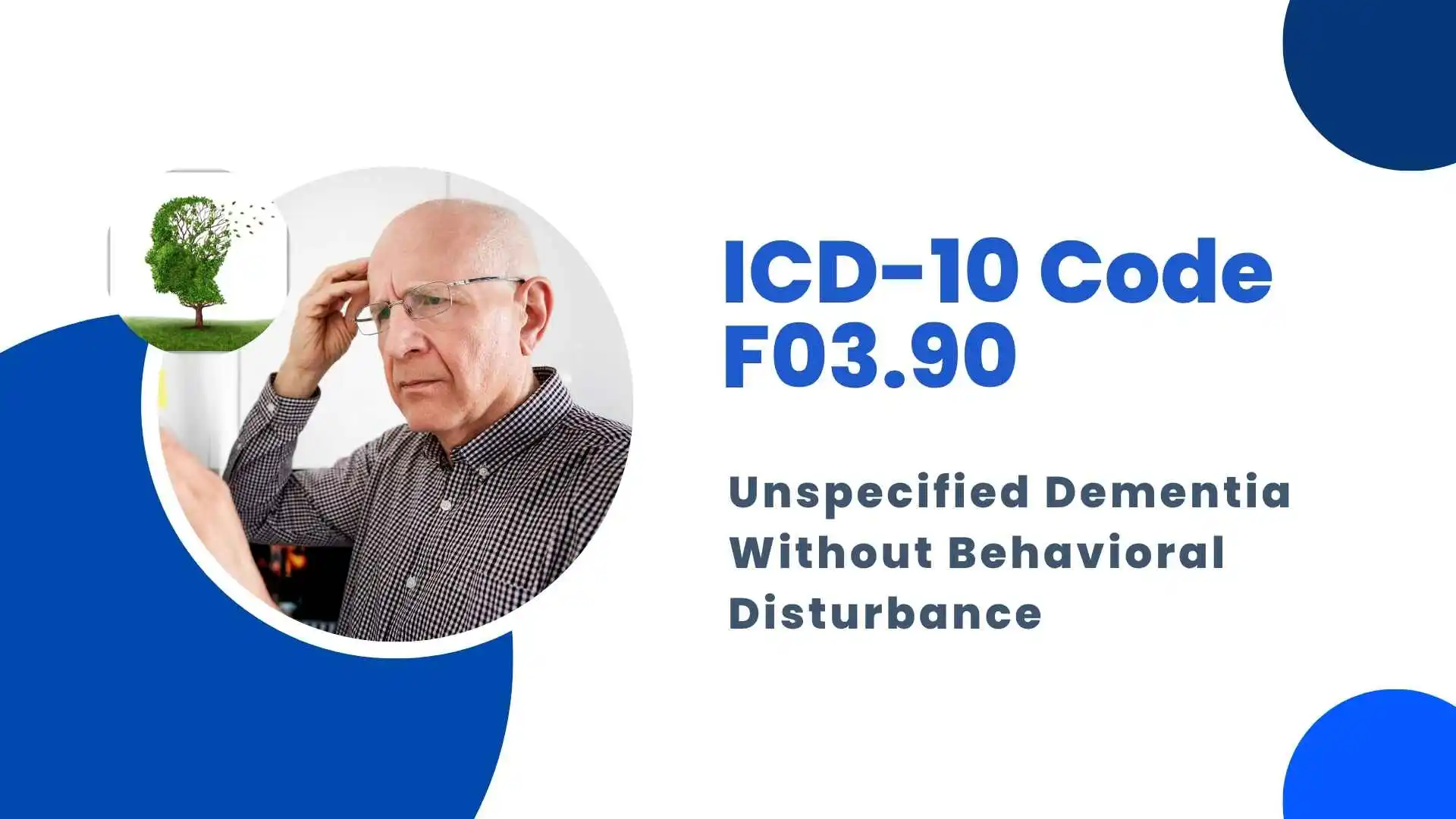Memory loss is one of the most common types of dementia and mental problems. If it happens, it can disturb your daily life. Unfortunately, millions of people are suffering from this problem. Nowadays, it is classified under the ICD-10 code system on the medical bills.
Healthcare providers utilize this system to comprehend the disease and its impact. However, it may be difficult for the patient or family members. Today, we will help you learn the codes for Unspecified dementia without behavioral disturbance. Keep reading to explore.
What Is Unspecified Dementia?
The common name “unspecified dementia” means that even though evidence for cognitive decline and memory loss exists in patients with this disease, no one can yet tell what kind or form of dementia it is. That’s why it’s called “unspecified.”Suppose the term “unspecified dementia” is being used.
In that case, this provider does not know whether the dementia can be put down to Alzheimer’s disease, vascular dementia, or some other type of cognitive decline.
The diagnosis needs to be made based on the patient’s symptoms and examination data, and it is not an uninformed guess. In the ICD-10 system, the term “ without behavioral disturbance” is specified when a person does not experience violent behavioral changes. The patient may experience memory problems in daily life.
How Doctors Classify Dementia in the ICD-10 Code System?
In this system, dementia is classified by its types. All kinds of dementia are classified under separate codes. Several common varieties include:
- Alzheimer’s Disease: At this stage of dementia patients usually have lived long enough through their jobs or community roles to actualize the assumption that they won’t see a better life future Their reasoning can be straightforward or convoluted when they enter this terrain; their sense of reality echoes through them still, making as if there were and never had been such.
- Vascular Dementia: This occurs when a person experiences difficulties with blood flow to the brain. Due to low blood flow, cognitive functions can be disturbed.
- Senile Dementia: Senile dementia is a common problem in elderly people, which occurs due to increasing age. A case study by Sun Ye proposes that it applies specifically to those individuals who are elderly and of ill health, who could be called those with dementia. Sun argues against broadening the meaning of this term any further, as it may cause confusion or even lead people to wrong conclusions.
The World Health Organization established ICD-10 as an international diagnostic classification standard for diseases, and its usage has spread along with medical input and output systems.
The code is used in healthcare settings to assign responsibility and provide reimbursement for medical services rendered, as well as in intellectual property management.
Key Features of ICD-10 Code F03.90
F03.90 ICD-10 Code for Unspecified Dementia Without Behavioral Disturbance. This section describes code F03.90 and explains its meaning.
- Unspecified Dementia: It means dementia can not be accurately identified, like other medical problems. It requires further investigation to determine the facts.
- Without Behavioral Disturbance: It means there will be no violent behavioral changes, such as agitated or aggressive behaviors.
Codes Related to Dementia
F 03.90 is not the only code used for dementia in ICD-10. There are other related codes that people should be aware of.
- Senile Dementia (ICD-10 Code F03.91): This is a condition in which seniors experience memory loss. It is a common occurrence that often affects elderly people. The age of manifestation is essential in identifying senile symptoms compared with other types of mental decline.
- Moderate Dementia (ICD-10 Code F 03.92): This code is for a patient at the stage when the decline in memory and problem-solving ability is noticeable, yet they can still gather information, analyze it, and choose the course their life shall take.
- R51.9 Diagnosis Code: This is used for headaches that may accompany cognitive disorders like dementia. Though not strictly a dementia code, it might be combined with particular dementia codes to describe patients who also have frequent headaches or migraines.
- DX Code for Dementia (F00-F03): These codes encompass various forms of dementia, ranging from Alzheimer’s disease to Dementia of Unspecified Type. The ICD-10 DX code for dementia is used to monitor cases in a clinic for record-keeping purposes, as well as for insurance and billing reasons.
Treatment and Diagnosis of Dementia
In diagnosing dementia, a healthcare provider typically considers a patient’s medical history, cognitive testing, and may also perform a brain scan. With unspecified dementia, further testing and evaluations are sometimes necessary despite the fact of a formal diagnosis, cause, such as Alzheimer’s disease or other health conditions.
After a confirmed diagnosis, the doctor chose the treatment. There is no specific treatment for recovering from dementia; however, some therapies can help manage quality of life. Mental therapies help in reducing its effects.
Patients with dementia may also present with general symptoms like fever. In such cases, it’s important to code fever accurately using ICD-10 code R50.9.
Memory Issues ICD-10: Diagnosis Is Important, But Not Always Easy to Discern
When it comes to diagnosing dementia, it has different signs. Memory loss is a usual sign that patients experience in daily life. However, it can also occur for other reasons, as we described above. Doctors check for the symptoms and then choose the correct code for that condition. It helps the doctors select the best treatment options for the patient.
The Importance of ICD-10 Codes in Health Care
There are several reasons why ICD-10 codes have assumed an essential position in the medical field:
- Billing: Accurate billing and insurance reimbursement, of course, require these codes. For instance, if a healthcare provider uses the ICD-10 code for dementia, it ensures the diagnosis is correctly entered into their patients’ records. Then, insurance companies will recognize it, and services will be reimbursed accordingly.
- Data tracking and research: Codes also help researchers track the problem and its effects on different individuals. It helps identify causes and find new solutions.
- Clinical Communication: Another advantage of using these codes is that they make it easier to communicate with healthcare providers. After reading the code doctor better understands the problem.
Looking Ahead: Dementia in the ICD-10 Era
With growing age, the chances of dementia increase over time. However, the condition of dementia can only be identified if you know the correct ICD-10 code for it. These codes help them spot and treat dementia early. When doctors diagnose and code correctly, patients get better care. They also receive the proper support for their memory-related health problems. It is best to take quick action to improve the quality of the patient.
Final Words
Since there are so many different causes of dementia, early detection and precise diagnostic coding can result in higher-quality healthcare for your patients. Without behavioral disturbances is the same thing as unspecified dementia, with the ICD-10 code F03.90 underneath a sheet. However, even this minor aspect may be enough to help sufferers attain relief sooner rather than later.
If you are a healthcare provider seeking a dependable billing service for dementia or other disorders, Providers Care Billing, LLC can meet these needs. Our experts help you during the billing process. At Providers Care Billing, we ensure that there are no errors, which means the right treatment and quick claims processing.




